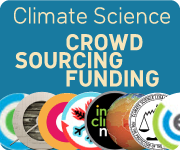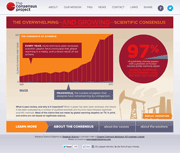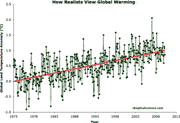Peer reviewed impacts of global warming
Posted on 24 January 2010 by John Cook
If the IPCC's mistaken prediction that the Himalayan glaciers would be gone by 2035 taught us anything, it's that we should always source our information from peer reviewed scientific literature rather than media articles. Consequently, I've spent the weekend overhauling the list of positives and negatives of global warming so that all sources were peer reviewed. The list is by no means comprehensive and I welcome any comments mentioning other impacts of global warming found in peer reviewed papers (good or bad). Please include a link to either the abstract or if possible, the full paper. Note to skeptics - here is an opportunity to pad out the positive column if you can find peer reviewed papers outlining any benefits of global warming.
Positives | Negatives |
Health- Winter deaths will decline as temperatures warm (HPA 2007)
| Health- Increased deaths to heatwaves - 5.74% increase to heatwaves compared to 1.59% to cold snaps (Medina-Ramon 2007)
- Spread in mosquite-borne diseases such as Malaria and Dengue Fever (Epstein 1998)
- Increase in occurrence of allergic symptoms due to rise in allergenic pollen (Rogers 2006)
|
Environment- Greener rainforests due to higher sunlight levels due to fewer rain clouds (Saleska 2009)
- Increase in chinstrap and gentoo penguins (Ducklow 2006)
| Environment- Rainforests releasing CO2 as regions become drier (Saleska 2009)
- Extinction of the European land leech (Kutschera 2007)
- Decrease in Adélie penguin numbers (Ducklow 2006)
- Disruption to New Zealand aquatic species such as salmonids, stream invertebrates, fishes (Ryan 2007)
- Oxygen poor ocean zones are growing (Stramma 2008, Shaffer 2009)
- Increased mortality rates of healthy trees in Western U.S. forest (Pennisi 2009)
- More severe and extensive vegetation die-off due to warmer droughts (Breshears 2009)
- Increased pine tree mortality due to outbreaks of pine beetles (Kurz 2008)
|
Glacier Melt
| Glacier Melt- Severe consequences for one-sixth of world's population dependent on glacial melt for water supply (Barnett 2005)
|































 Arguments
Arguments






























Global studies are always preferable over regional studies but this doesn't mean regional studies should be excluded if no global synthesis is available. However, the list should indicate if the study is regional in focus so I've updated some of the text accordingly.
The need for this page is two-fold. One to rebut the common skeptic argument that global warming is good. Secondly (and sadly) because of the persistent campaign to discredit the IPCC. People need reminding that beneath the politics, there is solid peer reviewed science studying the impacts of global warming. This page removes any barriers between the public and the original science.
However, I agree the list is incomplete and in need of improvement - my goal is to refine it over time and replace older studies with newer studies, regional studies with global studies as they become available. Plus I hope to improve the representation of the peer reviewed science as I find the time to read more deeply. Consequently help and feedback is very welcome to improve the content so again, thanks for your very specific suggestions.
Finding it hard to think of a positive impact of sea level rise...
Hmm, interesting suggestion. Now if only Lex Luthor had published any peer reviewed papers. In Energy and Environment, maybe? :-)
It is well established and undisputed that climate changes naturally - because climate is sensitive to radiative forcings. When the sun's output changes, climate changes at a rate of 3°C for every 3.7 Wm-2 of radiative forcing from the sun. This is the same climate that changes at a rate of 3°C for every 3.7 Wm-2 of radiative forcing from CO2. The natural climate change you cite actually provides evidence for the climate's sensitivity to CO2.
Actually, natural forcings on their own are showing a slight cooling effect over the last few decades (Meehl 2004).
As for the two approaches (mitigation or adaption), we need to be throwing our energies into both mitigation and adaption. This is because if we don't mitigate, future impacts will be even worse. And we need to prepare for adaption because we've already committed to a great deal of warming still "in the pipeline" (a topic I sorely need to write a post about which I will do as soon as I get the time).
I would be quite happy if you were to take the time to find more papers showing contrary results to papers currently listed. I appreciate the feedback you provided on forest growth and crop disease. It's not a competition to see who gets the biggest list but an effort to portray the state of the science.
The tongue in cheek remark was an artifact of the older version of the paper when I was referencing many media articles as my sources - originally, I was padding out the meagre positives column with entries like "Lots of work and money for lawyers" and "New extreme sport of glacier surfing". Once I got serious with only peer review sources, that comment was out-of-date and I've now removed it.
Re Pelto 2008, the abstract doesn't mention hydropower and unfortunately the full paper is hidden behind a paywall.